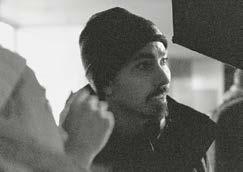
3 minute read
23 Going for Gold It may be set in
Going for Gold
Rogier Hesp
Advertisement
Rogier Hesp’s Gold (which world-premiered in IFFR Limelight) may be set in the world of competitive gymnastics but its writer-director says the same story could be told against the backcloth of any sport in which children are pushed too hard toward success by their parents, writes Geoffrey Macnab.
When Hesp conceived the film, supported by De Oversteek scheme and Production Incentive, he wanted an actor to play the young gymnast hero, Timo, who is getting ready to compete in the world championships. He thought he would give the actor six months to prepare.
However, the director was quickly advised that this wouldn’t work at all. Gymnasts spend adecade or more trying to reach the top of their sport. They have skills which no actor, however dedicated, can pick up in afew weeks or even after months of practice. “I knew then I had to go and search for areal gymnast.”
Hesp and his casting director therefore approached all the leading gymnast schools in The Netherlands. They were looking for someone who would not only be able to look credible, vaulting and performing somersaults, but who could carry off the dramatic scenes too. In the film, Timo has afraught relationship with his father, aformer gymnast now wheelchair-bound. He also has strong and complicated feelings towards the female physiotherapist.
Hesp stresses how he was “immediately sold” when he found his lead actor, David Wristers, aformer Dutch junior champion with aboyish face but avery muscular body. “He looks like aman but he’s really still just an adolescent boy – he’s like alittle kid in agrownup’s body,” the director notes of the qualities which made Wristers the perfect fit. It helped, too, that the gymnast turned actor was such an enigmatic presence on camera. When you looked at him, you could never tell exactly what he was thinking, Hesp notes.
The director kept on telling Wristers not to play the part but to be the part. The script was adapted to fit his personality and technique as agymnast, “just so it felt more natural for him.”
Unlike the character he plays, Wristers has “nice parents.” However, during his time on the circuit, he had seen plenty of pushy and ruthless mums and dads, driving their kids far too hard. “You can see them (these parents) sitting on the sidelines,” Wristers told him. These were the parents who yelled at their kids and made them cry whenever they didn’t win.
Gold was inspired by an article the writer-director read about an athlete who was eventually murdered by his father. “That really triggered myvision on the way we look at retrieving success,” he says.
“I haven’t seen any sports movie where you see the downside. It’s always the same story of the guy who wins and wins, then he loses, then he starts training more and he wins – and he is happy about it,” Hesp sums up the trajectory of the typical upbeat story of triumph told on screen.
What about his own background? Hesp says that his surgeon father, unlike the one depicted in the film, always encouraged him and told him to choose his own path.
Gold (which will be released in The Netherlands in March by September Films) may be Hesp’s debut feature but he is an experienced director of commercials. “The advantage of working in advertising is that you spend alot of time on set. Even if it is 30 seconds or 40 seconds, you still have to bring that emotion on screen,” he says.
Shooting on Gold went very smoothly. “The only thing we were scared of was what if David falls?” the director remembers. He pushed Writers hard, but thankfully the gymnast actor was always able to land on both feet.
Gold


